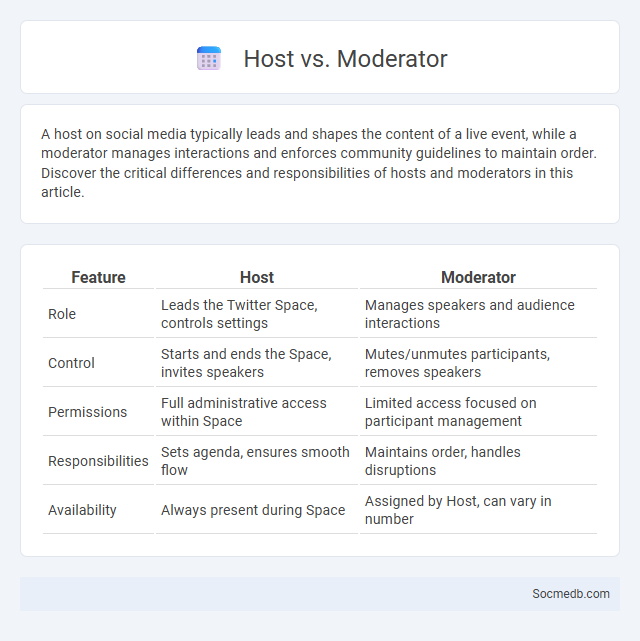
Photo illustration: Host vs Moderator
A host on social media typically leads and shapes the content of a live event, while a moderator manages interactions and enforces community guidelines to maintain order. Discover the critical differences and responsibilities of hosts and moderators in this article.
Table of Comparison
| Feature | Host | Moderator |
|---|---|---|
| Role | Leads the Twitter Space, controls settings | Manages speakers and audience interactions |
| Control | Starts and ends the Space, invites speakers | Mutes/unmutes participants, removes speakers |
| Permissions | Full administrative access within Space | Limited access focused on participant management |
| Responsibilities | Sets agenda, ensures smooth flow | Maintains order, handles disruptions |
| Availability | Always present during Space | Assigned by Host, can vary in number |
Understanding the Roles: Host, Moderator, and Spaces Host
A Host on social media platforms typically organizes and initiates events or discussions, maintaining overall control of the content flow and participant engagement. Moderators manage conversations by enforcing community guidelines, filtering inappropriate content, and facilitating smooth interactions among users. Spaces Hosts specifically manage live audio conversations, curating speakers, controlling participation, and enhancing user experience during real-time discussions.
Key Responsibilities of a Host
A social media host manages live sessions, engages viewers through interactive content, and responds promptly to comments to maintain audience interest. They are responsible for scripting and coordinating promotional segments to increase follower engagement and brand visibility. Monitoring analytics to adapt content strategies ensures sustained growth and viewer loyalty on platforms like Instagram, Facebook, and YouTube.
Essential Duties of a Moderator
A social media moderator ensures community guidelines are upheld by monitoring user-generated content for compliance, swiftly removing inappropriate posts, and managing user interactions to foster a respectful environment. Their essential duties include addressing user disputes, filtering spam, and maintaining platform safety to enhance user experience. By actively overseeing discussions, you help maintain a positive and engaging online space that aligns with brand values.
Unique Functions of a Spaces Host
As a Spaces Host, you control unique functions such as managing speaker access, curating the conversation flow, and engaging listeners in real-time audio sessions. You can spotlight key discussions by inviting specific participants, muting disruptive members, and highlighting important topics to maintain focus. Your role ensures an interactive, dynamic environment that fosters meaningful dialogue and community connection.
Host vs Moderator: Core Differences
Hosts on social media platforms initiate and lead live sessions or discussions, setting the tone and pacing of the event. Moderators focus on managing participant interactions, enforcing rules, and maintaining a respectful and organized environment. While hosts drive content and engagement, moderators ensure smooth communication and address any disruptive behavior.
Spaces Host vs Traditional Host: What Sets Them Apart?
Spaces Hosts on social media provide real-time, interactive audio conversations, fostering spontaneous and immersive engagement unlike Traditional Hosts who typically deliver structured, pre-planned content through video or text. Spaces Hosts leverage live audience participation, enabling dynamic discussions and instant feedback that enhance community building and user connection. The contrast lies in the immediacy and conversational nature of Spaces, creating unique opportunities for authentic dialogue unmatched by traditional social media hosting formats.
Skills Required for Each Role
Social media roles demand a diverse set of skills tailored to specific positions; content creators require creativity, storytelling, and graphic design expertise to craft engaging visuals and narratives. Social media managers must excel in strategic planning, data analytics, and community engagement to optimize campaigns and foster brand loyalty. Meanwhile, social media analysts focus on proficiency with analytics tools, data interpretation, and reporting to measure campaign performance and guide decision-making.
When to Choose a Host, Moderator, or Spaces Host
Choosing between a host, moderator, or Spaces host depends on the engagement level and control needed during social media events. Hosts typically manage the overall flow, set agendas, and introduce speakers, while moderators facilitate discussions by fielding questions and maintaining order. Spaces hosts on platforms like Twitter create live audio experiences, focusing on real-time interaction and community building around specific topics.
Impact on Audience Engagement
Social media platforms significantly boost audience engagement by enabling real-time interaction and personalized content delivery. Your ability to leverage targeted posts and multimedia elements increases user participation and fosters community building. Consistent analytics tracking helps optimize strategies, ensuring your content resonates and drives meaningful connections.
Best Practices for Collaborative Event Management
Effective collaborative event management on social media requires clear communication channels and defined roles to ensure seamless coordination among team members. Utilizing project management tools integrated with social platforms enhances task tracking and real-time updates, optimizing your event's execution. Engaging your audience through interactive content and timely responses increases visibility and boosts attendee participation.
 socmedb.com
socmedb.com